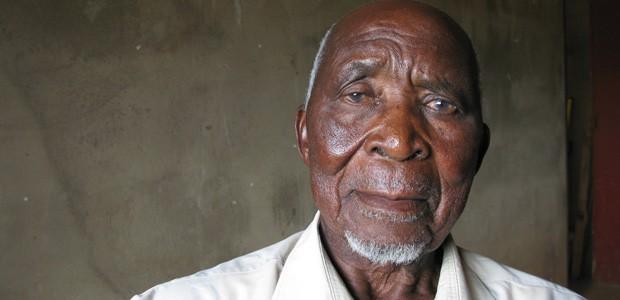Swaziland leader fought alongside Allied forces during World War II
Now 88-years-old, Chief Mnikwa Dlamini of Hhelehhele, in the Hhohho region of northern Swaziland, fought alongside Allied forces in Europe and North Africa during World War II. (Photo by Alex Gallafent.)
Story from The World. Listen to the above audio for a complete report.
The stock characters of World War II have been ingrained in our culture for decades. But this veteran breaks the molds.
Mnikwa Dlamini, for example, the current chief of Hhelehhele, a rural area in the north of Swaziland, is an 88-year-old veteran of the war in Europe.
Swaziland is a small country in southern Africa. It gained its independence in 1968.
Before that it was ruled by the British, and before them the Boers. When war came to Europe, the British came knocking.
“All our life here in Swaziland was under British control,” Chief Mnikwa recalled. “It was mostly OK, because the British and us had a good relationship. They at least treated us better than the Boers did.”
“We first heard in 1939 that the Germans were fighting with the British,” he said. “They only said that they used to be friends with the Germans, and then after a while the Germans had started fighting them.”
As war drew on, the then-King of Swaziland, Sobhuza, agreed to gather volunteers to fight as part of the Allied forces. In exchange, he extracted promises from the British of greater autonomy for his country in the future. But the young Mnikwa, not yet a chief, had his own reasons for signing up.
“I was eager to go to war because there were rumors in my home that I might become the next chief,” he said. “I said it’s better that I go to die. It was never in me. I said it’s better that I should go there because the way to heaven I would definitely find there.”
He didn’t want to be the chief because there would be “too much noise.”
So Mnikwa and a few thousand other young Swazis registered with the British authorities. They were given boots, khaki uniforms, and all the tools a soldier needs.
In late 1941, Mnikwa was shipped off for training near the Suez Canal. He was soon fighting in the deserts of Libya, and then in Italy.
“[Benito] Mussolini, who was a politician, was friendly with Hitler,” he said. “We then had to fight the Italians as well. There were lots of bombs around. And they used to have bombs planted around in the ground, and you would touch some of them and they would go off, and people would die.”
Along the way, Mnikwa met soldiers from all parts of the world, including the United States. He remembered they were “not people who liked to talk to other people very much. They would talk every now and then, but most of the time they kept to themselves.”
The war ended and Mnikwa traveled back to southern Africa. He spent some time in Johannesburg, trying to avoid the inevitable. But eventually he returned to Hhelehhele to take up his responsibilities.
“I then realized that I can’t just do my own will. Clearly it was God’s wish that I should live,” he said.
Dlamini, the chief of Hhelehhele went to war because he didn’t want to be a chief.
———————————————————-
PRI’s “The World” is a one-hour, weekday radio news magazine offering a mix of news, features, interviews, and music from around the globe. “The World” is a co-production of the BBC World Service, PRI and WGBH Boston. More about The World.
